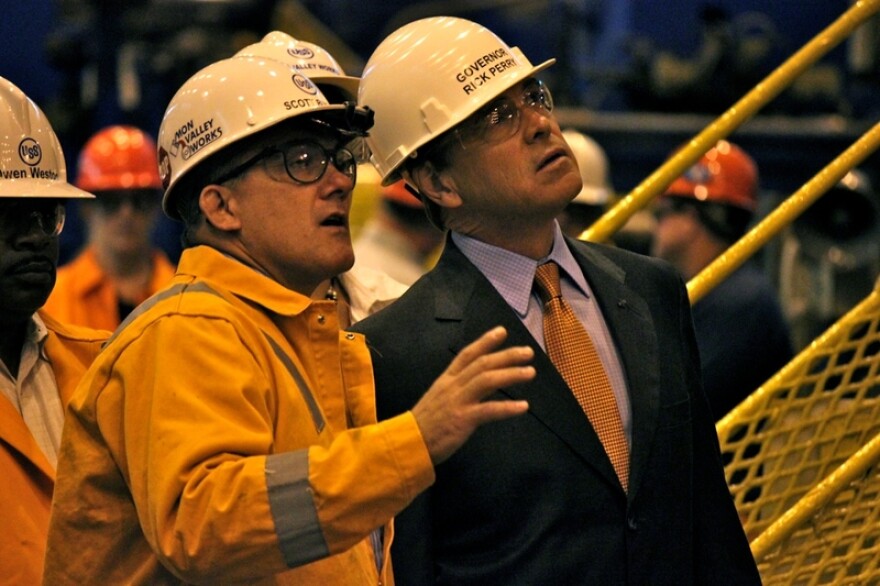At a steel mill outside Pittsburgh this morning, the Texas governor called for "a 'made in America' energy revolution."
Looking to turn the corner after a series of flat performances at debates where he was attacked for offering little substance but many sound bites, he delivered the first major economic policy speech of his campaign.
He unveiled a proposal he said would create 1.2 million jobs and "rebuild the engine of American prosperity" focused on increasing domestic production of the country's untapped oil, gas and coal. That would reduce U.S. dependence on foreign energy, he said, but also generate revenues that would help pay down the deficit.
"My plan," he said, "is based on this simple premise: Make what Americans buy, buy what Americans make and sell it to the world."
After promising to make his record on job creation in Texas the focus of his campaign, he yet to offer details of what his national policy might look like. Today, he presented what he said was the first phase of a reform package that he will roll out over the next week— policies he said he'd implement through executive orders as soon he was in office. It also marked the debut of a new campaign slogan: "Perry: Energizing American Jobs and Security."
Central to the plan is eliminating what he called "activist regulations" from the Obama Administration's Environmental Protection Agency, including those restricting oil exploration in Alaska's coastal plain and off-shore regions, and restoring "pre-Obama" production in the Gulf of Mexico. He also vowed to stop the EPA's "draconian measures" against greenhouse gases, which he said tied the American economy "in knots" while realizing little environmental benefit as countries like China and India plowed ahead with their own development.
For Perry, part of rolling back federal interference would mean stopping industry-specific tax credits, which he said "cost taxpayers and distort the marketplace." That would not include tax incentives for research and development, which he said allowed industry the freedom to explore emerging technology.
He also outlined a new vision for the federal environmental agency. He said he would "reform" the EPA's "bureaucracy" so that it would focus "on regional and cross-state issues, providing scientific research, as well as environmental analysis and cost-comparison studies to support state environmental organizations."
That means returning more regulatory authority to the states, which he said were best suited to make environmental rules because they had to live with the consequences of their actions. As president, he said, if states sought to "oppose energy exploration," he would respect that decision. But he added that "these instances represent the exception, not the rule."
In his own state, Perry has presided over a boom in both gas and wind energy production. He has also fast-tracked the approval of coal plants at a time when many other states have sought to scale back their reliance on coal. Today he attacked "hostility" to coal from both the Obama Administration and members his own party, saying that it was a vital part of job creation and that allowing the industry to invest in research was the best way to produce clean coal technology. Making coal production more costly, he said, was "taking more out of the pockets of American families."
Though expanding oil, gas and coal production are sure not to be popular with environmentalists, Perry said that his plan would protect "ecological treasures" like Yellowstone National Park and the Everglades.
"I reject the premise that we have to choose between energy and the environment," he said.




